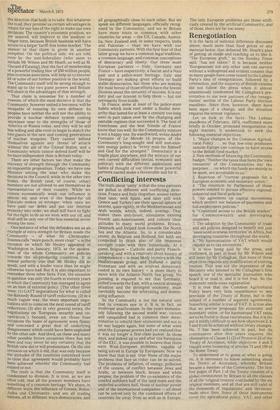Conflicting interests
The truth about `unity' is that the nine partners are pulled in different and conflicting directions. France and Italy (together, sooner rather than later, with Spain, and later still with Greece and Turkey) see their special sphere of interest, quite rightly, in the Mediterranean and Arab worlds, which, indeed, overlap. That makes them anti-Israel, stimulates existing French anti-Americanism, and colours their attitudes to many world problems. Britain, Denmark and Ireland look towards the North Sea and the Atlantic. So, to a considerable extent, do Belgium and Holland, but both are compelled to think also of the immense entrepOt trade with their hinterlands. At a guess, Belgium — Catholic and partly Frenchspeaking, and with a relatively short history of independence — is most likely to move with the Mediterranean group, and Holland — partly Protestant and with an evolved democracy rooted in its own history — is more likely to move with the Atlantic-North Sea group. No guessing is required to see that Germany, pulledtowards the East, with a central strategic situation and the strongest economy, must inevitably become the arbitrating and dominating influence.
So the Community is not the natural unit that its creators saw in it. It is, in fact, an irrelevant anachronism. In the years immediately following the second world war, victors and vanquished had in common their determination to rebuild their economies and not to let war happen again, but none of what were once the European powers had yet realized that it was no longer a first-class power. In those days, and indeed up to and after the formation of the EEC, it was possible to believe that there were West-European problems, capable of being solved in Europe by Europeans. Now we know that that is not true. None of the major problems that face us today can be so solved. The problems of inflation, of energy, pollution of the oceans, of conflict between Jews and Arabs, or between black, brown and white peoples; the problem of the co-existence of the overfed northern half of the land mass and the underfed southern half, those of nuclear power and of the international companies — all these can be solved only by the combined efforts of countries far away from as well as in Europe. The only European problems are those artificially created by the artificial Community, and of those, there are far too many.










































 Previous page
Previous page